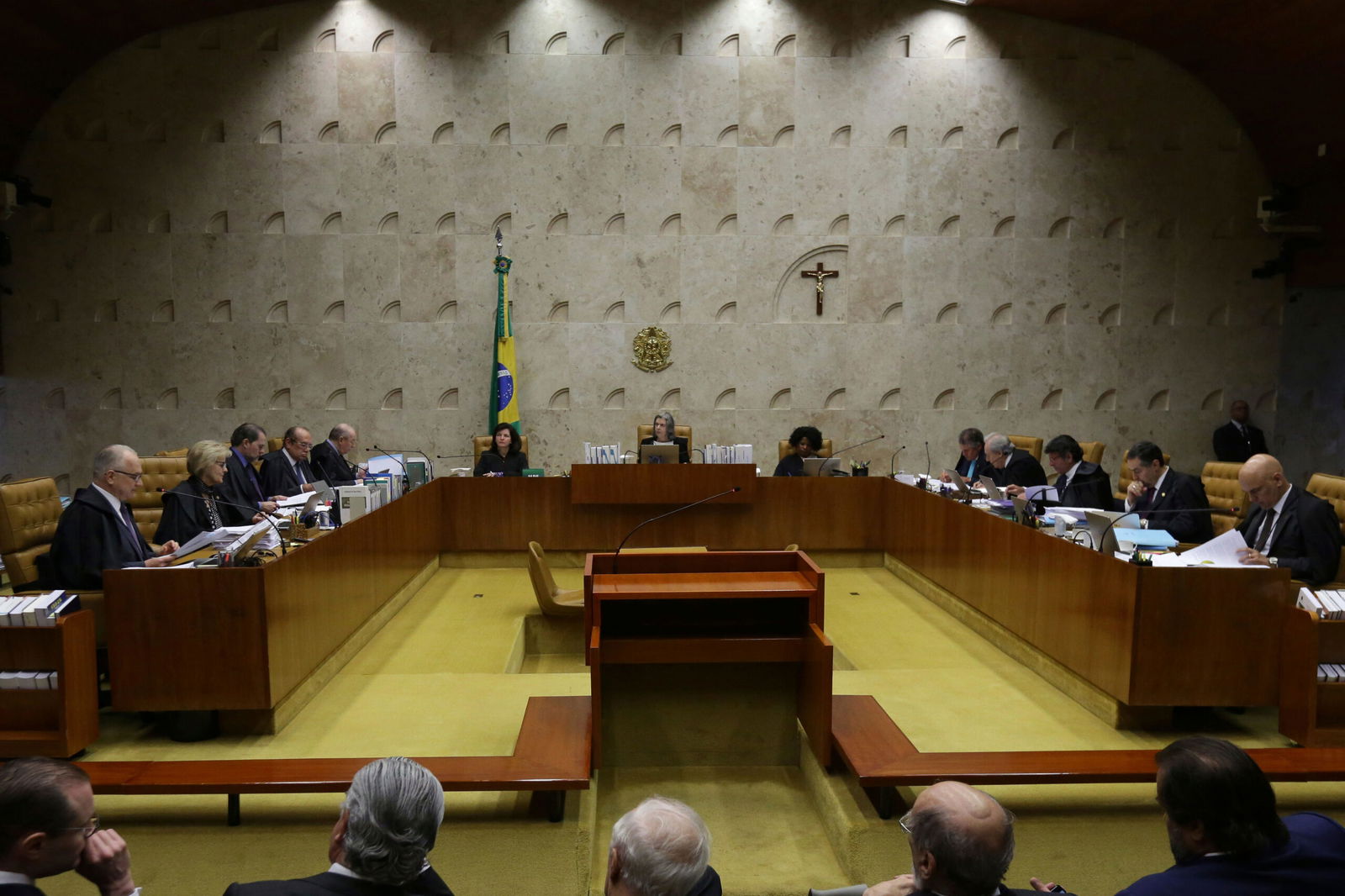Around the World briefs

By Associated Press
Brazil’s Supreme Court decriminalizes possession of marijuana for personal use
RIO DE JANEIRO | Brazil’s Supreme Court on Tuesday voted to decriminalize possession of marijuana for personal use, making the nation one of Latin America’s last to do so, in a move that could reduce its massive prison population.
With final votes cast on Tuesday, a majority of the justices on the 11-person court have voted in favor of decriminalization since deliberations began in 2015.
The justices must still determine the maximum quantity of marijuana that would be characterized as being for personal use and when the ruling will enter into effect. That is expected to finish as early as Wednesday.
All the justices who have voted in favor said decriminalization should be restricted to possession of marijuana in amounts suitable for personal use. Selling drugs will remain illegal.
In 2006, Brazil’s Congress approved a law that sought to punish individuals caught carrying small amounts of drugs, including marijuana, with alternative penalties such as community service. Experts say the law was too vague and didn’t establish a specific quantity to help law enforcement and judges differentiate personal use from drug trafficking.
Police continued to arrest people carrying small quantities of drugs on trafficking charges and Brazil’s prison population continued to swell.
“The majority of pre-trial detainees and those convicted of drug trafficking in Brazil are first-time offenders, who carried small amounts of illicit substance with them, caught in routine police operations, unarmed and with no evidence of any relationship with organized crime,” said Ilona Szabó, president of Igarapé Institute, a think tank focusing on public security.
Congress has responded to the top court’s ongoing deliberations by separately advancing a proposal to tighten drug legislation, which would complicate the legal picture surrounding marijuana possession.
In April, the Senate approved a constitutional amendment criminalizing possession of any quantity of illicit substance. The lower house’s constitutional committee approved the proposal on June 12, and it will need to pass through at least one other committee before going to a floor vote.
If lawmakers pass such a measure, the legislation would take precedence over the top court’s ruling but still could be challenged on constitutional grounds.
Speaking to reporters in capital Brasilia, the Senate’s president, Rodrigo Pacheco, said it isn’t the Supreme Court’s place to issue a decision on the matter.
“There is an appropriate path for this discussion to move forward and that is the legislative process,” he said. “It is something that, obviously, arouses broad discussion and it is a subject of preoccupation for Congress.”
Last year, a Brazilian court authorized some patients to grow cannabis for medical treatment after the health regulator in 2019 approved guidelines for the sale of medicinal products derived from cannabis. But Brazil is one of a few countries in Latin America that hasn’t decriminalized the possession of small quantities of drugs for personal consumption.
The Supreme Court’s ruling has long been sought by activists and legal scholars in a country where the prison population has become the third largest in the world. Critics of current legislation say users caught with even small amounts of drugs are regularly convicted on trafficking charges and locked up in overcrowded jails, where they are forced to join prison gangs.
“Today, trafficking is the main vector for imprisonment in Brazil,” said Cristiano Maronna, director of JUSTA, a civil society group focusing on the justice system.
Brazil ranks behind U.S. and China in countries with the highest prison populations, according to the World Prison Brief, a database tracking such figures.
Some 852,000 individuals were deprived of liberty in Brazil as of December 2023, according to official data. Of those, nearly 25% were arrested for possession of drugs or trafficking. Brazilian jails are overcrowded, and Black citizens are disproportionately represented, accounting for more than two-thirds of the prison population.
A recent study by Insper, a Brazilian research and education institute, determined that Black individuals found by police with drugs were slightly more likely to be indicted as traffickers than white people. The authors analyzed over 3.5 million records from Sao Paulo’s public security secretariat from 2010 to 2020.
“An advance in drug policy in Brazil! This is an issue of public health, not security and incarceration,” leftist lawmaker Chico Alencar wrote on X after the ruling.
By contrast, Gustavo Scandelari, a specialist on Brazil’s penal code at law firm Dotti Advogados, said he doesn’t foresee the ruling bringing about a significant shift from the status quo, even after the top court establishes a maximum quantity of marijuana for personal use. Scandelari argued that the amount will remain one determinant of whether authorities consider a person a dealer or a user, but not the only one.
Some Brazilians, like 47-year-old Rio de Janeiro resident Alexandro Trindade, have managed to be upset with both the Supreme Court decriminalizing marijuana and Congress pushing to keep it illegal.
“The Supreme Court is not the right place (for such decision). This should be submitted to a plebiscite for the people to decide,” Trindade said. “Both the Supreme Court and Congress have been very opposed to society in this.”
As in other countries in the region, like Argentina, Colombia and Mexico, medicinal use of cannabis in Brazil is allowed, though in a highly restricted manner.
Uruguay has fully legalized the use of marijuana, and in some U.S. states recreational use for adults is legal. In Colombia, possession has been decriminalized for a decade, but a law to regulate the recreational use of marijuana so that it can be sold legally failed to pass in the Senate in August. Colombians can carry small amounts of marijuana, but selling it for recreational purposes is not legal.
The same goes for Ecuador and Peru. Both distribution and possession remain illegal in Venezuela.
Argentina’s Supreme Court ruled in 2009 it was unconstitutional to penalize an adult for consuming marijuana if it didn’t harm others. But the law has not been changed and users are still arrested, although most cases are thrown out by judges.
Uruguay became the first country to legalize marijuana for recreational use in 2013 although it was only implemented in 2017. Uruguay’s whole industry, from production to distribution, is under state control and registered users can buy up to 40 grams of marijuana per month through pharmacies.
Kenya’s president says he won’t
sign a finance bill that led protesters to storm the parliament
NAIROBI, Kenya | Kenya’s president said on Wednesday he won’t sign into law a finance bill proposing new taxes that prompted thousands of protesters to storm the parliament the previous day, leaving several people killed as police opened fire. It was the biggest assault on Kenya’s government in decades.
The government wanted to raise funds to pay off debt, but Kenyans said the bill would have caused more economic pain as millions struggle to get by. Tuesday’s chaos led authorities to deploy the military, and Kenyan President William Ruto called protesters’ actions “treasonous.”
He now says the proposed bill caused “widespread dissatisfaction” and that he has listened and “conceded.” It’s a major setback for Ruto, who came to power vowing to help Kenyans cope with rising costs but has seen much of the country — led by its youth — unite in opposition to his latest attempted reforms.
“It is necessary for us to have a conversation as a nation on how … do we manage the affairs of the country together,” he said.
Kenyans faced the lingering smell of tear gas and military in the streets on Wednesday morning, a day after the protesters’ act of defiance that Ruto had called an “existential” threat. Parliament, city hall and the supreme court were cordoned off.
At least 22 people were killed, the Kenya National Human Rights Commission said, and police were accused of some shooting deaths. Chairperson Roseline Odede said 50 people were arrested.
Ruto acknowledged there were deaths, without elaborating, called it an “unfortunate situation” and offered condolences. He also said about 200 people had been wounded in the chaos. Part of the parliament building burned and clashes occurred in several communities beyond the capital, Nairobi.
Kenya has seen protests in the past, but activists and others warned the stakes were now more dangerous — Ruto on Tuesday vowed to quash unrest “at whatever cost,” even as more protests were called at the State House on Thursday.
“We are dealing with a new phenomenon and a group of people that is not predictable,” said Herman Manyora, an analyst and professor at the University of Nairobi. “We don’t know whether these people will fear the army.”
The demonstrations showed Kenyans bridged tribal and other divisions to keep the finance bill from becoming law. It would have raised taxes and fees on a range of items and services, from egg imports to bank transfers.
White House national security spokesman John Kirby urged the Kenyan government to exercise “restraint so that no further Kenyans are put in harm’s way while exercising their right to peaceful public assembly.”
There were no reports of violence Wednesday, but there was fear. Civil society groups have reported abductions of people involved in recent protests and expect more to come. Kenya’s High Court ordered police to release all those arrested in the protests. Ruto said those allegedly abducted had been released or processed in court.
Later Wednesday, the High Court, acting on a challenge from Kenyan lawyers, ordered the military be pulled back from the streets. It was not immediately clear if the government would do so.
The mother of a killed teenager, Edith Wanjiku, told reporters at a morgue that the police who shot her son should be charged with murder because her 19-year-old was unarmed. “He had just completed school and was peacefully protesting,” she said.
Many young people who helped vote Ruto into power in 2022, supporting his promises of economic relief, now oppose the pain of reforms. Inequality among Kenyans has sharpened along with long-held frustrations over state corruption. The booming young population is also frustrated by the lavish lifestyles of politicians, including the president.
“How did we get here?” Kenya’s vice president, Rigathi Gachagua, asked Wednesday in nationally broadcast comments after the president’s turnabout, openly wondering how the government had become so unpopular in just two years. “We were the darling of the Kenyan people.”
The bill was not as important as people’s lives, said one Nairobi businessman, Gideon Hamisi. “Many young people lost their lives yesterday. I am a young man, and I feel deeply pained by what transpired.”
Opposition leader Raila Odinga called for dialogue. “Kenya cannot afford to kill its children just because the children are asking for food, jobs and a listening ear.”
The president’s concession was “self preservation” by a leader worried about his reputation, opposition lawmaker Edwin Sifuna wrote on X.
The events are a sharp turn for Ruto, who has been embraced by the United States as a welcome, stable partner in Africa while frustration grows elsewhere on the continent with the U.S. and some other Western powers.
In May, Ruto went to Washington in the first state visit by an African leader in 16 years. On Tuesday, as the protests erupted, the U.S. designated Kenya as its first major non-NATO ally in sub-Saharan Africa, a largely symbolic act but one highlighting their security partnership. Also Tuesday, hundreds of Kenyan police deployed to lead a multinational force against gangs in Haiti, an initiative that brought thanks from President Joe Biden.
U.S. Secretary of State Antony Blinken had been expected to speak with Ruto on Wednesday about the Haiti deployment, a call planned prior to Tuesday’s violence.
Gassy cows and pigs will face a carbon tax in Denmark, a world first
COPENHAGEN, Denmark | Denmark will tax livestock farmers for the greenhouse gases emitted by their cows, sheep and pigs from 2030, the first country to do so as it targets a major source of methane emissions, one of the most potent gases contributing to global warming.
The aim is to reduce Danish greenhouse gas emissions by 70% from 1990 levels by 2030, said Taxation Minister Jeppe Bruus.
As of 2030, Danish livestock farmers will be taxed $43 per ton of carbon dioxide equivalent in 2030. The tax will increase to $108 by 2035. However, because of an income tax deduction of 60%, the actual cost per ton will start at $17.3 and increase to 300 kroner by 2035.
Although carbon dioxide typically gets more attention for its role in climate change, methane traps about 87 times more heat on a 20-year timescale, according to the U.S. National Oceanic and Atmospheric Administration.
Levels of methane, which is emitted from sources including landfills, oil and natural gas systems and livestock, have increased particularly quickly since 2020. Livestock account for about 32% of human-caused methane emissions, says the U.N. Environment Program.
“We will take a big step closer in becoming climate neutral in 2045,” Bruus said, adding Denmark “will be the first country in the world to introduce a real CO2 tax on agriculture” and hoped other countries would follow suit.
New Zealand had passed a similar law due to take effect in 2025. However, the legislation was removed from the statute book on Wednesday after hefty criticism from farmers and a change of government at the 2023 election from a center-left ruling bloc to a center-right one. New Zealand said it would exclude agriculture from its emissions trading scheme in favor of exploring other ways to reduce methane.
Almost all of the methane from raising livestock, some 90%, comes from the way they digest, through fermentation, and is released as burps through their mouths. Cows make up most of this belched methane. Most of the remaining 10% of livestock methane comes off manure ponds on both pig and cattle operations.
In Denmark, the deal was reached late Monday between the center-right government and representatives of farmers, the industry and unions, among others, and presented Tuesday.
Denmark’s move comes after months of protests by farmers across Europe against climate change mitigation measures and regulations that they say are driving them to bankruptcy.
The Danish Society for Nature Conservation, the largest nature conservation and environmental organization in Denmark, described the tax agreement as “a historic compromise.”
“We have succeeded in landing a compromise on a CO2 tax, which lays the groundwork for a restructured food industry -– also on the other side of 2030,” its head Maria Reumert Gjerding said after the talks in which they took part.
A typical Danish cow produces 6 metric tons (6.6 tons) of CO2 equivalent per year. Denmark, which is a large dairy and pork exporter, also will tax pigs although cows produce far higher emissions than pigs.
The tax is to be approved in the 179-seat Folketing, or parliament, but the bill is expected to pass after the broad-based consensus.
According to Statistic Denmark, there were as of June 30, 2022, 1,484,377 cows in the Scandinavian country, a slight drop compared to the previous year.
A U.S. officiant marries 10 same-sex couples in Hong Kong via video chat
HONG KONG | Ten same-sex couples got married in the United States over the internet from Hong Kong, a semi-autonomous southern Chinese city that does not formally recognize such unions but offers them legal protections.
The event Tuesday was timed to mark Pride Month, with a registered officiant from the American state of Utah making their marriages official. Most states require the couple to appear in person to fill out paperwork and present identification, but Utah does not, and its digital application process has made it a go-to for online weddings since the COVID-19 pandemic.
Family members gathered in a hotel wedding hall in Hong Kong’s Kowloon district as couples exchanged rings, then raised their glasses in a toast.
“I hope one day that everybody would accept the fact that love is not just between a man and a woman. It’s between two people who love each other,” said Lucas Peng, a 66-year-old Singaporean businessperson living in Hong Kong, and one of the 20 people tying the knot in Tuesday’s semi-virtual event.
“It’s just two humans who love each other. That’s the key. That’s the important part. And to be able to publicly declare our love for each other today is a very important step for us, definitely,” Peng said.
Wedding organizer Kurt Tung said he hoped the event would send a message to the public.
“In Hong Kong, there’s not yet a way to go to a marriage registry to get married, but there’s still this way we can offer for them to realize their dreams of getting married,” Tung said.
Keeping with cultural and religious traditions, Hong Kong only recognizes weddings between a man and a woman. Self-governing Taiwan is the closest place that issues same-sex marriages, and Hong Kong recognizes those couples’ legal rights, though the city doesn’t call them marriages. It has no laws banning same-sex relationships.
In September, the Hong Kong’s top court ruled that the local government should provide a legal framework for recognizing same-sex partnerships, including rights to inheritance, joint custody of children, taxation, spousal visas and benefits from employment with the local government.
That came after LGBTQ+ rights activist Jimmy Sham, who married his husband in New York in 2013, raised a challenge at the city’s Court of Final Appeal that Hong Kong’s laws violated the constitutional right to equality. That contrasts with the increasingly conservative political tone in the Asian financial hub, where edicts from the authoritarian Communist Party leadership in Beijing have led to criticism from around the world that it’s squashing democratic rights and free speech.
—From AP reports


